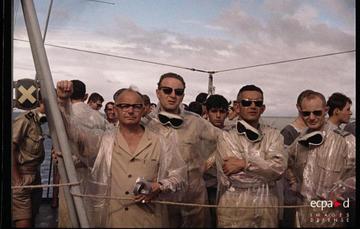2-Day Workshop: Medical and Environmental Approaches to Military Nuclear Risk
Organisers:
Renaud Meltz (CNRS-CAK)
Benoît Pouget (Sciences Po Aix-Mesopolis)
With support from Mark Harrison (University of Oxford)
French:
Le présent workshop intitulé ‘Medical and environmental approaches to military nuclear risk’ a pour objet d’explorer, dans une double perspective à la fois comparatistes et diachronique, les conséquences des essais/tirs/frappes nucléaires à l’articulation des enjeux médicaux, sanitaires, environnementaux, sociaux et politiques. Il s’agira notamment d’explorer the question of the health and environnmtal impacts of nuclearisation of the Pacific and the consequences of the government of risk and the health public policy. The question of the legacies seront également explorés tout comme les problématiques liées à la construction et à la circulation des connaissances, normes et pratiques en matière de risque radiologique. Enfin, il s’agira de comprendre – en élargissant le spectre géographique et thématique – de comprendre les ressorts des dispositifs de prévention/anticipation des attaques et des catastrophes nucléaires en explorant en partie le rôle des services de santé militaires dans les dispositifs de défense civile.
Le présent workshop est organisé par le Pr. Renaud Meltz (CNRS – Centre Alexandre Koyré) et le Dr Benoît Pouget (Sciences Po Aix – Mesopolhis). Il bénéficie du soutien du CNRS, de l’UMR 7064 Mesopolhis, de la Maison Française d’Oxford et de l’Université d’Oxford (Oxford centre for history of Sciences, Medicine and technology.
Il s’inscrit dans le cadre travaux du SOSI (Suivi Ouvert des Société et de leurs interaction) Observatoire des héritages du Centre d’Expérimentation du Pacifique (CEP) et des essais nucléaires porté depuis 2023 par le Renaud Meltz hébergé à la MSH du Pacifique (campus d’Outumaoro), sous la double tutelle du CNRS et de l'université de la Polynésie française (UPF).
English:
The purpose of this workshop, entitled 'Medical and environmental approaches to military nuclear risk', is to explore, from both a comparative and diachronic perspective, the consequences of nuclear tests/fires/strikes at the intersection of medical, health, environmental, social and political issues. In particular, the question of the health and environmental impacts of nuclearization of the Pacific and the consequences of the government of risk and the public health policy will be explored. The question of legacies will also be explored, as will the issues related to the construction and circulation of knowledge, standards and practices in the field of radiological risk. Finally, the aim will be to understand – by broadening the geographical and thematic spectrum – to understand the driving forces behind the mechanisms for preventing/anticipating nuclear attacks and disasters by exploring in part the role of military health services in civil defense mechanisms.
This workshop is organized by Prof. Renaud Meltz (CNRS - Centre Alexandre Koyré) and Dr. Benoît Pouget (Sciences Po Aix - Mesopolhis). It is supported by the CNRS, UMR 7064 Mesopolhis, the Maison Française d'Oxford and the University of Oxford (Oxford Centre for the History of Science, Medicine and Technology).
It is part of the work of the SOSI (Suivi Ouvert des Société et de leurs interaction) Observatory of the legacies of the Centre d'Expérimentation du Pacifique (CEP) and nuclear tests carried out since 2023 by Renaud Meltz, hosted at the MSH du Pacifique (Outumaoro campus), under the dual supervision of the CNRS and the University of French Polynesia (UPF).
PROGRAMME
7 May (Wednesday)
| 13:30-13:34 | Opening Remarks: Renaud Melz and Benoît Pouget |
| 13:45-15:15 |
Panel 1: Objectivising Knowledge, Sharing Knowledge and Managing Uncertainty |
|
Quentin Comminsoli (SPX- SOSI CEP) |
|
|
Manatea Taiarui (Université de Polynésie Française) |
|
|
Fiona Bowler (Oxford) |
|
| 15:15-15:30 | Coffee Break |
| 15:30-17:15 |
Panel 2: Environmental Consequences of Nuclear Testing in the Pacific Area |
|
Benjamin Furst (Université de Haute-Alsace) |
|
| Ryoo Kyoryul (National Korea Maritime and Ocean University) South Korea's Long-line Tuna Fishery and military nuclear tests in the Pacific Ocean |
|
| 17:15-18:30 |
Keynote Speaker: Renaud Meltz (CNRS CAK) |
8 May (Thursday)
| 09:00-11:00 |
Panel 3: Preparing for/Anticipating Nuclear/Atomic Risks: Civil Defence Under Pressure |
|
Mark Harrison (Oxford) |
|
|
Benoît Pouget (SPX-Mesopolhis) |
|
|
Jeong Ran Kim (Oxford University) |
|
| 11:00-12:30 |
Panel 4: Legacy and Long-Term Effects of Nuclear Testing on Human Health |
|
Marie Brualla (Université Montpellier III) |
|
| Florence Mury (MSHP -SOSI CEP) The memory of health risks among former Polynesian CEP workers: a critical rereading of life on the sites in the light of recent revelations |
|
|
Christopher Hill (University of South Wales) |
|
| 12:30-13:00 | Concluding Remarks: Renaud Melz and Benoît Pouget |
| 13:00 | Lunch |



